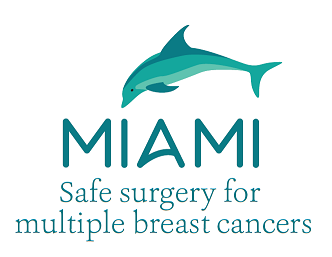
 Overview
Overview
The MIAMI trial is the first randomized trial design to address the clinical safety of Therapeutic Reduction Mammoplasty (TM) associated with the excision of each cancer and the possibility of performing up to two tumour bed(s) boost(s) radiotherapy. The rationale for the MIAMI trial is based on NIHR feasibility trial funding. Currently, a systematic review shows no high quality clinical evidence to robustly inform women regarding the long-term safety of TM, with no high quality comparative cohort studies and no randomized trials.
The rationale for the MIAMI randomised trial is based on the following question: Why in the presence of occult foci in 60-80% of mastectomy specimens, is it that most cancers present as unifocal disease? Is there a case for saying whether Multiple Ipsilateral Breast Cancers (MIBC) is a different disease, requiring a different treatment approach? The MIAMI trial will address the contributions of cancer and surrounding stromal influences on disease extent and the safety of Therapeutic Mammoplasty (TM) versus Mastectomy.
Aims
The MIAMI MDT audit invites a lead trainee surgeon and MDT colleagues at each UK breast centre to be responsible for accurate prospective data collection and to represent each centre in a citable peer-reviewed publication. This audit should occur during the MDT, aiming to record high quality information that is potentially corroborated in an oncoplastic MDT.
Inclusion criteria
- >40 years with MIBC, with the largest clinical cancer measuring 30mm as part of multifocal or multicentric “disease sites”. 30mm may include the size of a single cancer and its surrounding small satellite cancers. Clinically diagnosed (ultrasound and biopsy) either axillary lymph node negative or positive where axillary treatment depends on local policy
- Minimum of two invasive foci of breast cancer as defined within a “disease site”
- Suitable for TM (best practice) using one large lumpectomy (multifocal) or any number of “distant” lumpectomies (multicentric) to excise “disease sites”
- Fit for adjuvant therapy
Exclusion criteria
- Neo-adjuvant therapy
- Women considered high risk by local centre or known to have BRCA1/2 gene mutation
- Ductal Carcinoma in situ (DCIS) only, and extensive DCIS
- Bilateral breast cancers
- Previous breast cancer (invasive or DCIS in either breast)
- Pregnancy as confirmed on blood tests or ultrasound examination
- Metastatic disease
- Any previous type of breast radiotherapy
- Significant other clinical risk factors and co-morbidities according to each centre’s local policies e.g. BMI*, Diabetes, Smoker
- Previous or concomitant malignancy except adequately treated: non-melanomatous skin cancer; in situ carcinoma of the cervix and in situ melanoma
Further information
For expressions of interest, please contact Miss Zoe Winters at z.winters@ucl.ac.uk or 07710454528 or The UCL Surgical and Interventional Trials Unit, SITU.MIAMI@ucl.ac.uk.
Please click the links below to access documents relevant to the MIAMI Trial MDT Audit.
